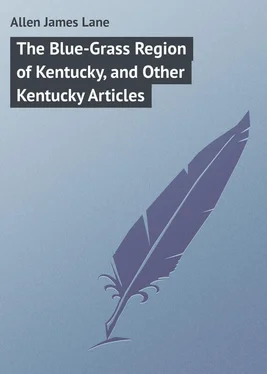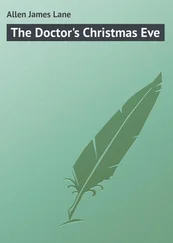James Allen - The Blue-Grass Region of Kentucky, and Other Kentucky Articles
Здесь есть возможность читать онлайн «James Allen - The Blue-Grass Region of Kentucky, and Other Kentucky Articles» — ознакомительный отрывок электронной книги совершенно бесплатно, а после прочтения отрывка купить полную версию. В некоторых случаях можно слушать аудио, скачать через торрент в формате fb2 и присутствует краткое содержание. Жанр: foreign_prose, Путешествия и география, на английском языке. Описание произведения, (предисловие) а так же отзывы посетителей доступны на портале библиотеки ЛибКат.
- Название:The Blue-Grass Region of Kentucky, and Other Kentucky Articles
- Автор:
- Жанр:
- Год:неизвестен
- ISBN:нет данных
- Рейтинг книги:3 / 5. Голосов: 1
-
Избранное:Добавить в избранное
- Отзывы:
-
Ваша оценка:
- 60
- 1
- 2
- 3
- 4
- 5
The Blue-Grass Region of Kentucky, and Other Kentucky Articles: краткое содержание, описание и аннотация
Предлагаем к чтению аннотацию, описание, краткое содержание или предисловие (зависит от того, что написал сам автор книги «The Blue-Grass Region of Kentucky, and Other Kentucky Articles»). Если вы не нашли необходимую информацию о книге — напишите в комментариях, мы постараемся отыскать её.
The Blue-Grass Region of Kentucky, and Other Kentucky Articles — читать онлайн ознакомительный отрывок
Ниже представлен текст книги, разбитый по страницам. Система сохранения места последней прочитанной страницы, позволяет с удобством читать онлайн бесплатно книгу «The Blue-Grass Region of Kentucky, and Other Kentucky Articles», без необходимости каждый раз заново искать на чём Вы остановились. Поставьте закладку, и сможете в любой момент перейти на страницу, на которой закончили чтение.
Интервал:
Закладка:
"In Kentucky," writes Professor Shaler, in his recent history, "we shall find nearly pure English blood. It is, moreover, the largest body of pure English folk that has, speaking generally, been separated from the mother country for two hundred years." They, the blue-grass Kentuckians, are the descendants of those hardy, high-spirited, picked Englishmen, largely of the squire and yeoman class, whose absorbing passion was not religious disputation, nor the intellectual purpose of founding a State, but the ownership of land and the pursuits and pleasures of rural life, close to the rich soil, and full of its strength and sunlight. They have to this day, in a degree perhaps equalled by no others living, the race qualities of their English ancestry and the tastes and habitudes of their forefathers. If one knows the Saxon nature, and has been a close student of Kentucky life and character, stripped bare of the accidental circumstances of local environment, he may amuse himself with laying the two side by side and comparing the points of essential likeness. It is a question whether the Kentuckian is not more like his English ancestor than his New England contemporary. This is an old country, as things go in the West. The rock formation is very old; the soil is old; the race qualities here are old. In the Sagas, in the Edda, a man must be over-brave. "Let all who are not cowards follow me!" cried McGary, putting an end to prudent counsel on the eve of the battle of the Blue Licks. The Kentuckian winced under the implication then, and has done it in a thousand instances since. Over-bravery! The idea runs through the pages of Kentucky history, drawing them back into the centuries of his race. It is this quality of temper and conception of manhood that has operated to build up in the mind of the world the figure of the typical Kentuckian. Hawthorne conversed with an old man in England who told him that the Kentuckians flayed Tecumseh where he fell, and converted his skin into razor-strops. Collins, the Kentucky Froissart, speaking of Kentucky pioneers, relates of the father of one of them that he knocked Washington down in a quarrel, and received an apology from the Father of his Country on the following day. I have mentioned this typical Hotspur figure because I knew it would come foremost into the mind of the reader whenever one began to speak with candor of Kentucky life and character. It was never a true type: satire bit always into burlesque along lines of coarseness and exaggeration. Much less is it true now, except in so far as it describes a kind of human being found the world over.
But I was saying that old race qualities are apparent here, because this is a people of English blood with hereditary agricultural tastes, and because it has remained to this day largely uncommingled with foreign strains. Here, for instance, is the old race conservatism that expends itself reverentially on established ways and familiar customs. The building of the first great turnpike in this country was opposed on the ground that it would shut up way-side taverns, throw wagons and teams out of employment, and destroy the market for chickens and oats. Prior to that, immigration was discouraged because it would make the already high prices of necessary articles so exorbitant that the permanent prosperity of the State would receive a fatal check. True, however, this opposition was not without a certain philosophy; for in those days people went to some distant lick for their salt, bought it warm from the kettle at seven or eight cents a pound, and packed it home on horseback, so that a fourth dropped away in bitter water. Coming back to the present, the huge yellowish-red stage-coach rolls to-day over the marbled roads of the blue-grass country. Families may be found living exactly where their pioneer ancestors effected a heroic settlement – a landed aristocracy, if there be such in America. Family names come down from generation to generation, just as a glance at the British peerage will show that they were long ago being transmitted in kindred families over the sea. One great honored name will do nearly as much in Kentucky as in England to keep a family in peculiar respect, after the reason for it has ceased. Here is that old invincible race ideal of personal liberty, and that old, unreckoning, truculent, animal rage at whatever infringes on it. The Kentuckians were among the very earliest to grant manhood suffrage. Nowhere in this country are the rights of property more inviolable, the violations of these more surely punished: neither counsel nor judge nor any power whatsoever can acquit a man who has taken fourpence of his neighbor's goods. Here is the old land-loving, land-holding, home-staying, home-defending disposition. This is not the lunching, tourist race that, to Mr. Ruskin's horror, leaves its crumbs and chicken-bones on the glaciers. The simple rural key-note of life is still the sweetest. Now, after the lapse of more than a century, the most populous town contains less than twenty thousand white souls. Along with the love of land has gone comparative content with the annual increase of flock and field. No man among them has ever got immense wealth. Here is the old sense of personal privacy and reserve which has for centuries intrenched the Englishman in the heart of his estate, and forced him to regard with inexpugnable discomfort his neighbor's boundaries. This would have been a densely peopled region, the farms would have been minutely subdivided, had sons asked and received permission to settle on parts of the ancestral estate. This filling in and too close personal contact would have satisfied neither father nor child, so that the one has generally kept his acres intact, and the other, impelled by the same land-hunger that brought his pioneer forefather hither, has gone hence into the younger West, where lie broader tracts and vaster spaces. Here is the old idea, somewhat current still in England, that the highest mark of the gentleman is not cultivation of the mind, not intellect, not knowledge, but elegant living. Here is the old hereditary devotion to the idea of the State. Write the biographies of the Kentuckians who have been engaged in national or in local politics, and you have largely the history of the State of Kentucky. Write the lives of all its scientists, artists, musicians, actors, poets, novelists, and you find many weary mile-stones between the chapters.
Enter the blue-grass region from what point you choose – and you may do this, so well traversed is it by railways – and you become sensitive to its influence. If you come from the North or the East, you say: "This is not modern America. Here is something local and unique. For one thing, nothing goes fast here." By-and-by you see a blue-grass race-horse, and note an exception. But you do not also except the rider or the driver. The speed is not his. He is a mere bunch of mistletoe to the horse. Detach him, and he is not worth timing. Human speed for the most part lies fallow. Every man starts for the goal of life at his own natural gait, and if he sees that it is too far off for him to reach it in a lifetime, he does not run the faster, but has the goal moved nearer him. The Kentuckians are not provincial. As Thoreau said, no people can long remain provincial who have a propensity for politics, whittling, and rapid travelling. They are not inaccessible to modern ideas, but the shock of modern ideas has not electrified them. They have walled themselves around with old race instincts and habitudes, and when the stream of tendency rushes against this wall, it recoils upon itself instead of sweeping away the barrier.
The typical Kentuckian regards himself an American of the Americans, and thinks as little of being like the English as he would of imitating the Jutes. In nothing is he more like his transatlantic ancestry than in strong self-content. He sits on his farm as though it were the pole of the heavens – a manly man with a heart in him. Usually of the blond type, robust, well formed, with clear, fair complexion, that grows ruddier with age and stomachic development, full neck, and an open, kind, untroubled countenance. He is frank, but not familiar; talkative, but not garrulous; full of the genial humor of local hits and allusions, but without a subtle nimbleness of wit; indulgent towards purely masculine vices, but intolerant of petty crimes; no reader of books nor master in religious debate, faith coming to him as naturally as his appetite, and growing with what it feeds upon; loving roast pig, but not caring particularly for Lamb's eulogy; loving his grass like a Greek, not because it is beautiful, but because it is fresh and green; a peaceful man with strong passions, and so to be heartily loved and respected or heartily hated and respected, but never despised or trifled with. An occasional barbecue in the woods, where the saddles of South Down mutton are roasted on spits over the coals of the mighty trench, and the steaming kettles of burgoo lend their savor to the nose of the hungry political orator, so that he becomes all the more impetuous in his invectives; the great agricultural fairs; the race-courses; the monthly county court day, when he meets his neighbors on the public square of the nearest town; the quiet Sunday mornings, when he meets them again for rather more clandestine talks at the front door of the neighborhood church – these and his own fireside are his characteristic and ample pleasures. You will never be under his roof without being touched by the mellowest of all the virtues of his race – simple, unsparing human kindness and hospitality.
Читать дальшеИнтервал:
Закладка:
Похожие книги на «The Blue-Grass Region of Kentucky, and Other Kentucky Articles»
Представляем Вашему вниманию похожие книги на «The Blue-Grass Region of Kentucky, and Other Kentucky Articles» списком для выбора. Мы отобрали схожую по названию и смыслу литературу в надежде предоставить читателям больше вариантов отыскать новые, интересные, ещё непрочитанные произведения.
Обсуждение, отзывы о книге «The Blue-Grass Region of Kentucky, and Other Kentucky Articles» и просто собственные мнения читателей. Оставьте ваши комментарии, напишите, что Вы думаете о произведении, его смысле или главных героях. Укажите что конкретно понравилось, а что нет, и почему Вы так считаете.











